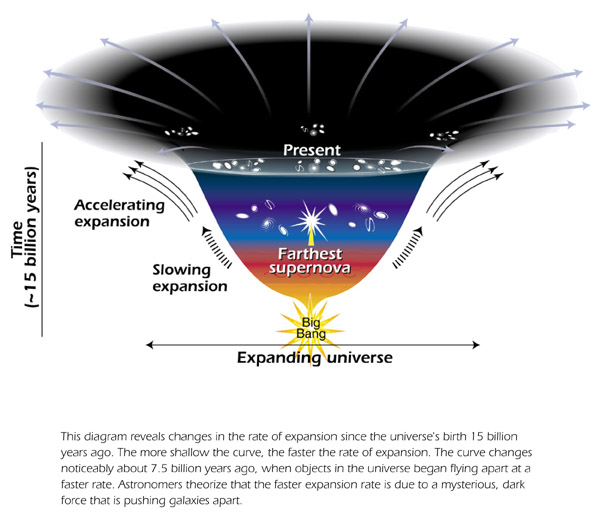The Difference between Dark Matter and Dark Energy

Difference Between Dark Matter And Dark Energy
Our universe is expanding more than ever, since its origin from the Big Bang, 14 billion years ago. Previously, the scientists thought it would only slow down because of the gravitational pull that attracts all matter towards the inside. But, the Hubble Space Telescope observations prove that the Universe is actually expanding rather than slowing down. This cannot happen without the presence of some other form of energy that is superior to the gravitational strength, though no one knows what it is. This incomprehensible energy, which repels matter outward, is called Dark energy. The visible matter, including the Earth, stars and billions of galaxies, made of subatomic particles clustered into atoms, constitute only 4% of the mass of the universe. We do not know the content of the other mass, except that 22% of it is the invisible substance called Dark matter, and 74% is the ever dominating Dark energy. Though both can be measured by calculating their effect on the detectable matter of the universe, it is not known whether these two are one and the same.
Dark Energy
Dark energy is omnipresent and its effect increases as cosmos swells. Its existence enables light to gain energy from the residual radiation if it travels through large masses, and is responsible for cosmic microwaves. When gravity becomes weaker due to the space expansion, dark energy will begin to dominate. It is assumed that it is this dark energy that is responsible for the expansion of the universe. Dark energy, which also is known as cosmological constant as well as quintessence, accelerates the expansion process by becoming an anti-gravity force. According to Albert Einstein, the empty space is seldom vacuum and has own constant energy to force the universe expand faster and faster.
(A 2009 simulation of dark matter in the Universe)
Opposing Einstein’s observation, new theories have evolved explaining dark energy as a new form of dynamical energy fluid that fills the space, which works against matter and normal energy. Some researchers find quantum fluctuations as the real source of the repulsive force accelerating the space expansion. However, all agrees that Dark energy, being uniform throughout the space, is behind the faster rate of acceleration of the expanding cosmos, though its density is low (6.91 × 10−27 kg/m3) compared to the density of ordinary matter or the dark matter of the galaxies. In spite of all of these observations, sceptics emphasize that it is nothing but an illusion caused by the relative movement of the Earth with the rest of the cosmos. Whatever it is, Dark energy is the greatest scientific mystery of our time.
Dark Matter
Dark matter is non-luminous particles of matter that exerts gravitational effects on the visible matter of galaxies and clusters of galaxies. It is dark, invisible, and covers most of the cosmic matter. Scientists could not observe it directly as it is not possible to detect it with what they have as instruments, today. But its presence is unequivocally confirmed by its gravitational effects. It is this gravity of dark matter that pulls the universe together, keeping it away from collapse. If the universe contains only detectable matter, the galaxies we see would not have emerged at all. They would only fly apart without having enough matter of gravitational force to keep them close together. In the beginning of the universe, the dominating Dark matter amplified low fluctuations in the Cosmic Microwave background to make the present universe.
As per astrophysics, dark matter is undetectable, non-baryonic matter which exerts gravitational effects on stars and galaxies. It is a hypothetical particle without any charge, no spin, and insignificant mass composed by quantum chromo dynamics. Also, there are chances that it might be formed out of exotic particles like axions or weakly interacting massive particles, immediately after the creation of the universe. It is interesting to note that the existence of dark matter was discovered accidentally while observing the outer regions of the Milky Way. If the efforts of scientists to recognize dark matter continue without any fulfilment in the near, such an improbability poses a question: What if the universe ends, all of a sudden?
- Difference Between Flash Suppressor And Muzzle Brake - October 10, 2015
- The Differences Between Urethane and Polyurethane - October 9, 2015
- Difference Between Pelican And Stork - October 5, 2015
Search DifferenceBetween.net :
Leave a Response
References :
[0] http://science.nasa.gov/astrophysics/focus-areas/what-is-dark-energy/
[1]. http://www.dailymail.co.uk/sciencetech/article-2201997/Dark-energy-mystery- solved-Researchers-claim-99-996-sure-real.html#ixzz3milALumE
[2] http://curious.astro.cornell.edu/astronomy-links/108-cosmology-and-the-big- bang/dark- matter/658-what-s-the-difference-between-dark-matter-and-dark- energy-intermediate
[3]http://upload.wikimedia.org/wikipedia/commons/c/ce/Dark_Energy.jpg
[4]http://science.nationalgeographic.com/science/space/dark-matter/
[5]http://hubblesite.org/hubble_discoveries/dark_energy/de- what_is_dark_energy.php
